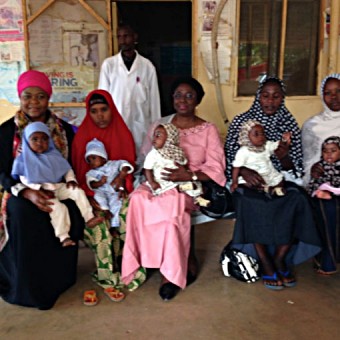
Mercy Ahun
Special Representative to GAVI-eligible Countries

Credit: GAVI/2014/Mercy Ahun
I was happy to be in Sokoto, northern Nigeria last month to see how the introduction of the latest batch of pentavalent vaccines funded by the GAVI Alliance was progressing.
I was encouraged by the words of mothers who had brought their young babies to be immunised at Ringin Sambo Urban Clinic. They welcomed the pentavalent vaccine because it means one injection instead of two for their children – a key message when Nigeria introduces two more injectable vaccines in the near future, inactivated polio vaccine and pneumococcal vaccine against the primary cause of pneumonia.
Cold comfort
The mothers waited patiently for health staff to collect the five-in-one vaccines from the district cold store. The clinic had been given its own fridge two years ago to protect vaccines from high temperature, but a lack of solar panels to power the unit meant it was never installed. With GAVI-funded fridges due to reach Sokoto later in 2014, I was comforted to learn that both the State and the 23 LGA chairmen had signed a Memorandum of Understanding with the federal government stating clearly roles and responsibilities for cold store maintenance.
"This is the first time that we are putting such measures in place even before the arrival of the fridges," said the Executive Secretary of the Primary Health Care Board.
Unlike previous versions, the GAVI-funded ‘solar direct drive’ fridges do not need batteries to run. This new technology avoids the risk of batteries being stolen and requires minimal maintenance.
Power of public-private partnership
Sokoto State began introducing GAVI Alliance-supported pentavalent vaccine in December last year as part of Nigeria’s drive to roll out the vaccine over a record 18 months instead of the three-year period initially planned. Prior to the vaccine’s introduction in 14 Nigerian states in June 2012, there had been widespread stock outs of DTP (diphtheria, tetanus and pertussis) vaccine and other routine immunisation vaccines.
Pentavalent’s three-phase introduction across Nigeria underlines the power of public-private partnership. With the National Primary Health Care Development Agency in the lead, WHO, UNICEF,the Clinton Health Access Initiative, the GAVI Alliance, the Bill & Melinda Gates Foundation and other partners have worked together to plan, provide training and oversee the national rollout of the vaccine
Cross-continent connections
This included biweekly partner conference calls connecting three continents- Africa, Europe and North America- to ensure partners were fully up to speed on supply chain, logistics, data issues, etc. across the country.
Such thorough preparation brought the opportunity to identify and fix potential issues in the national introduction. For example, during work by Alliance partners to support the procurement of new equipment, train staff and link supply chain to other parts of the health system, we discovered incorrect recordings of the new vaccine. This led to an estimated loss of one third of pentavalent data for the first group of States rolling out the vaccine. We were able to act promptly to address this.
Single digit coverage in Sokoto
At Basansan Rural Health Clinic, the officer-in-charge pointed to planning charts for immunisation sessions pinned to walls. These showed DTP3 coverage for 2013 was 67% and more than 90% in urban and rural clinics respectively.
I asked why the 2013 Demographic & Health Survey registered Sokoto with single digit coverage. ”Ha, many reasons,” said the TSHIP volunteer (a Maternal and Newborn Child Health project funded by USAID), “The denominator is too low for example – there are more babies in our catchment area than the projected figures we receive from authorities.” This would lead to an artificially high administrative coverage misleading health workers to believe that they have covered all existing children. A coverage survey usually reflects true coverage on the ground.
Challenges
The Executive Secretary was also very clear on the challenges that Nigeria still faces in rolling out new vaccines:
- lack of coordination; until this year, all partners had their own implementation plan;
- resources from partners are not harmonised;
- the State Primary Health Care (PHC) Board is not functioning well and the policy of PHC staff under one roof is yet to be implemented;
- lack of proper utilisation of allocated funds;
- slow processes for retirement of approved funds.
With all of the above in mind, we discussed next steps and how we can improve coordination in the state.
